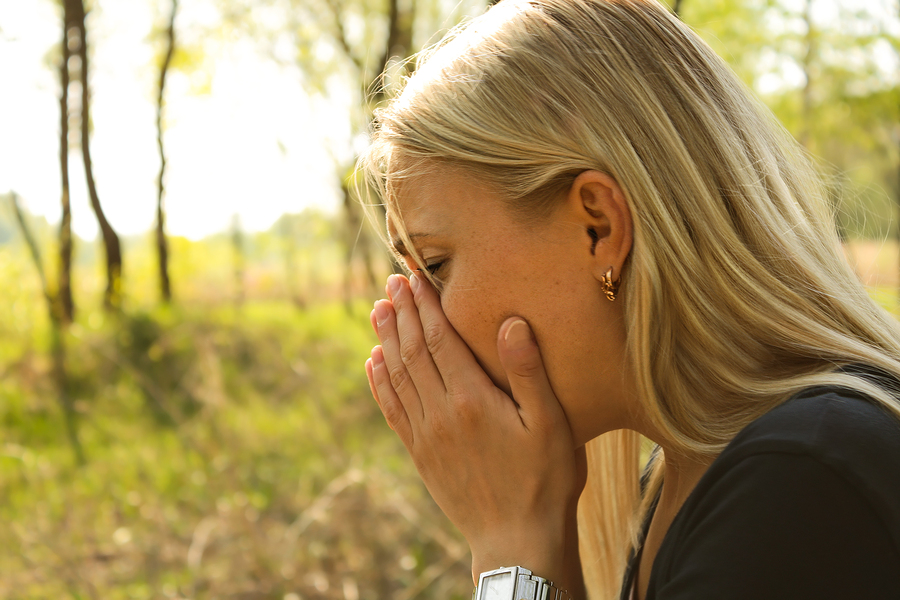#086 10 Surprising Ways to Stop Allergies
 Dr. John Day
Dr. John DayDr. Day is a cardiologist specializing in heart rhythm abnormalities at St. Mark’s Hospital in Salt Lake City, Utah. He graduated from Johns Hopkins Medical School and completed his residency and fellowships in cardiology and cardiac electrophysiology at Stanford University. He is the former president of the Heart Rhythm Society and the Utah chapter of the American College of Cardiology. |

Podcast: Play in new window | Download
Subscribe: RSS
10 Surprising Ways to Stop Allergies
Increasingly, more and more Americans are suffering from seasonal allergies. Is it climate change or are we too “clean?”
Regardless of the cause, I will share 10 surprising ways to stop allergies. What we eat may be more important in controlling seasonal allergies than taking medications or locking ourselves inside.
My Allergies
I remember dreading my lawn mowing duties as a child. My parents had an acre of land and it would take me a couple of hours to mow and trim the yard.
Each time I mowed the lawn my eyes became itchy, puffy, and watery. If I rubbed my eyes too much they would sometimes become swollen shut.
My nose was even worse. It would get so bad that I would have to breath from my mouth.
In those days we did not have any non-sedating antihistamines. All that was available was Benadryl. To survive the lawn mowing experience each week, I had to pretreat with 50 mg of Benadryl. The problem was that Benadryl would make me so sleepy that I walked around like a zombie for the rest of the day.
Interestingly, my seasonal allergies seemed to disappear at about the same time I starting eating healthy. At the time I did not give this much thought. Could there be a scientific basis as to why my seasonal allergies resolved?
Is Climate Change Causing More Seasonal Allergies?
Many scientists have speculated that rising global temperatures are too blame for more seasonal allergies. Warmer temperatures mean longer growing seasons for plants and longer pollen exposure for us. Indeed, scientific studies have now shown that climate change is making the allergy problem worse.
Hygiene Hypothesis
The hygiene hypothesis states that because we are not being exposed to enough dirt, bacteria, fermented foods, etc. during childhood, our immune systems fail to develop properly. Indeed, studies show that an immature immune system may lead to a higher risk of allergies, autoimmune diseases, and even Alzheimer’s Disease. While the hygiene hypothesis is most important for children, even adults might benefit from getting dirty once in a while.
Crete: The Land without Seasonal Allergies
Is it possible to live in a place where people don’t suffer from allergies? Crete is one such place.
Crete, the legendary birthplace of Zeus, is a small Greek island in the Mediterranean. Besides being known for their exceptionally healthy lives, the people in Crete also rarely suffer from seasonal allergies.
As researchers have studied this phenomenon, they have concluded their their exceptionally healthy Mediterranean Diet protects them from the usual seasonal allergies.
While I am not suggesting that allergy sufferers should move to Crete, what I am saying is that there are powerful lessons we can learn from these people to prevent seasonal allergies here in the U.S.
10 Surprising Ways to Stop Allergies
While most people assume that the key to fighting seasonal allergies is to lock yourself up indoors or take medications, few understand how our diets can determine if we will even react to pollen in the first place. To help you conquer your seasonal allergies this year, let me share with you 10 surprising ways to stop allergies.
1. Eat Fermented Foods (Probiotics)
Through mechanisms that have not fully been worked out, fermented foods or probiotics seem to protect us against seasonal allergies. Many studies have confirmed this finding. Perhaps by introducing fermented foods we are helping to retrain our immune systems through the “Hygiene Hypothesis.”
2. Eat Grapes
Interestingly, half of all children living in Crete eat grapes each day. Those who eat grapes regularly are 81% less likely to suffer from seasonal allergies or asthma.
In particular, red grape skins may be the most protective part of the grape. Researchers aren’t sure if it is the antioxidant effects or the resveratrol in the red grapes that offers allergy relief.
3. Go Nuts
In addition to protecting your heart and brain, nuts also seem to protect against seasonal allergies. Indeed, eating nuts 3 or more times a week has been shown to cut seasonal allergies in half. Once again, it could be the antioxidants of nuts or even the vitamin E that is protective against seasonal allergies.
4. Eat Oranges
Orange eaters experience 70% less seasonal allergies. Other studies have shown that even vitamin C, from any source, may help to protect against allergies.
5. Love Fish
In addition to the heart healthy effects of fish, fish has been shown to decrease the risk of seasonal allergies by 55%. The high omega 3s of oily fish are known to decrease inflammation and may help the immune system to better behave when exposed to pollen.
6. An Apple a Day
While an apple a day won’t keep the pollen away it just might keep the allergy doctor away. Studies show that apple eaters are 86% less likely to suffer from seasonal allergies.
7. Eat Fresh Tomatoes
Tomatoes are yet another superfood when it comes to preventing seasonal allergies. Indeed, studies have shown that tomatoes can reduce seasonal allergies by 68%.
8. Minimize Animal Meat
In a large study of 156,035 Australians, researchers reported that those who ate the most animal meat were 18% more likely to develop seasonal allergies. Animal meats are well known to increase inflammation and oxidative stress.
As this was just an observational study, it is not clear whether it was how the meat was prepared or whether it was animal meat from fast food restaurants that contributed to the increased risk of seasonal allergies.
9. Minimize Dairy Except for Yogurt with Live Bacterial Cultures
From the same Australian study, dairy also appeared to increase the risk of seasonal allergies by 18%. This is not surprising as dairy is one of the most common causes of food allergies as well. However, yogurt with live bacterial cultures, has been shown to consistently decrease the risk of seasonal allergies.
10. Avoid Processed Foods
One thing that has been consistent with many studies is that people eating the “Standard American Diet” (SAD), which is high in processed and prepared foods, have a much higher risk of developing seasonal allergies. For example, even eating margarine once a week more than doubled the risk of developing allergies.
The Anti-Allergy Diet
To put all of these data together, the best way to avoid seasonal allergies is to eat a healthy diet. The diet which has been shown to fight allergies is one high in fruits, vegetables, nuts, fish, and fermented foods while low in animal meat, dairy (except yogurt with live bacterial cultures), and processed foods. In other words, this is the Mediterranean Diet or the diet eaten faithfully by most people living in Crete.
While living in Crete would be nice, a Mediterranean Diet may be all that is needed to escape your allergies this year.
Have you found that a healthy diet has helped you with your seasonal allergies? If so, please share your experiences below in the comments section so that others may benefit.
Disclaimer
If you suffer from seasonal allergies, please work with your physician to treat this condition. You may have specific health conditions that require a diet different from the Mediterranean Diet. Please do not self diagnose or treat based on anything that you have read in this article.
Disclaimer Policy: This website is intended to give general information and does not provide medical advice. This website does not create a doctor-patient relationship between you and Dr. John Day. If you have a medical problem, immediately contact your healthcare provider. Information on this website is not intended to diagnose or treat any condition. Dr. John Day is not responsible for any losses, damages or claims that may result from your medical decisions.

